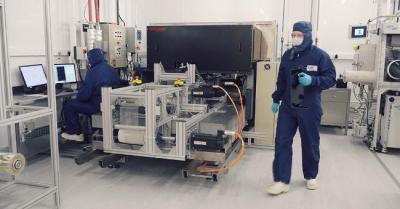The Centre for Process Innovation (CPI) is a UK based R&D institute that helps companies develop and scale manufacturing processes. The CPI, in collaboration with Heidelberg Instruments have developed a new high-resolution high-speed roll-to-roll (R2R) digital lithography tool for the manufacture of flexible organic thin film transistors (OTFTs).

The machine is already installed at the CPI's National Printable Electronics Facility in County Durham, UK. The new tool provides the ability to continuously manufacture OTFTs directly onto rolls of plastic film at rates approaching 0.1 m2/min.
The key feature of the new tool is its ability to expose rolls of film with digital images generated in real time, thereby allowing it to dynamically compensate for any distortions present in each layer of the transistor as it is built up. It does this by using a state-of-the-art optical exposure engine along with a laser and digital mirror device capable of through-putting up to 150 megabytes per second of image data.
The system is capable of four micron line and space resolution in the printed pattern using a print density equivalent to twenty five thousand dots per inch. It uses an exposure wavelength of 355 nanometres and is compatible with a wide range of standard i-line photoresist materials as well as being suitable for other UV-curing processes.
CPI's current OLED system supports both small evaporized and soluble OLED materials. Their pilot production line uses slot die technology to allow the coating of substrates (4", 6" or 8" in size) in a highly repeatable and reproducible manner with a uniform film thickness of under 50 nm. The CPI recently announced plans to co-develop ALD solutions with Beneq and has also demonstrated new flexible OLED lighting panels.

